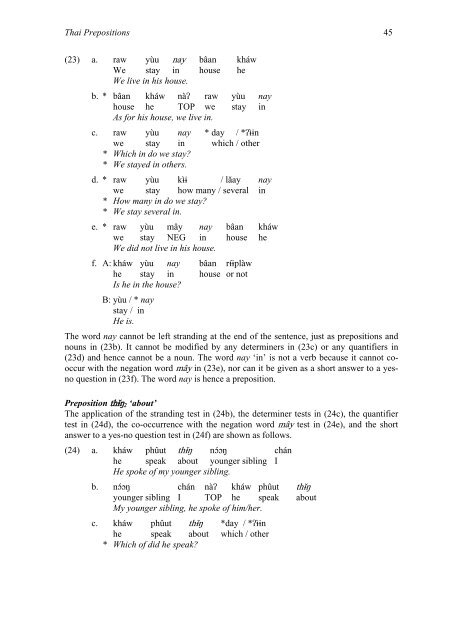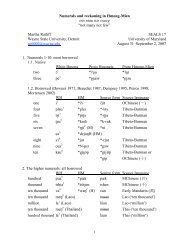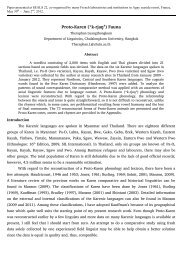proto-southwestern-tai revised: a new reconstruction - seals 22
proto-southwestern-tai revised: a new reconstruction - seals 22
proto-southwestern-tai revised: a new reconstruction - seals 22
Create successful ePaper yourself
Turn your PDF publications into a flip-book with our unique Google optimized e-Paper software.
Thai Prepositions 45<br />
(23) a. raw yùu nay bâan kháw<br />
We stay in house he<br />
We live in his house.<br />
b. * bâan kháw nàʔ raw yùu nay<br />
house he TOP we stay in<br />
As for his house, we live in.<br />
c. raw yùu nay * day / *ʔɨ̀ɨn<br />
we stay in which / other<br />
* Which in do we stay?<br />
* We stayed in others.<br />
d. * raw yùu kɨ̀ɨ / lǎay nay<br />
we stay how many / several in<br />
* How many in do we stay?<br />
* We stay several in.<br />
e. * raw yùu mây nay bâan kháw<br />
we stay NEG in house he<br />
We did not live in his house.<br />
f. A: kháw yùu nay bâan rɨ́ɨplàw<br />
he stay in house or not<br />
Is he in the house?<br />
B: yùu / * nay<br />
stay / in<br />
He is.<br />
The word nay cannot be left stranding at the end of the sentence, just as prepositions and<br />
nouns in (23b). It cannot be modified by any determiners in (23c) or any quantifiers in<br />
(23d) and hence cannot be a noun. The word nay ‘in’ is not a verb because it cannot cooccur<br />
with the negation word mây in (23e), nor can it be given as a short answer to a yesno<br />
question in (23f). The word nay is hence a preposition.<br />
Preposition thɨ̌ŋ2 ‘about’<br />
The application of the stranding test in (24b), the determiner tests in (24c), the quantifier<br />
test in (24d), the co-occurrence with the negation word mây test in (24e), and the short<br />
answer to a yes-no question test in (24f) are shown as follows.<br />
(24) a. kháw phûut thɨ̌ŋ nɔ́ɔŋ chán<br />
he speak about younger sibling I<br />
He spoke of my younger sibling.<br />
b. nɔ́ɔŋ chán nàʔ kháw phûut thɨ̌ŋ<br />
younger sibling I TOP he speak about<br />
My younger sibling, he spoke of him/her.<br />
c. kháw phûut thɨ̌ŋ *day / *ʔɨ̀ɨn<br />
he speak about which / other<br />
* Which of did he speak?





